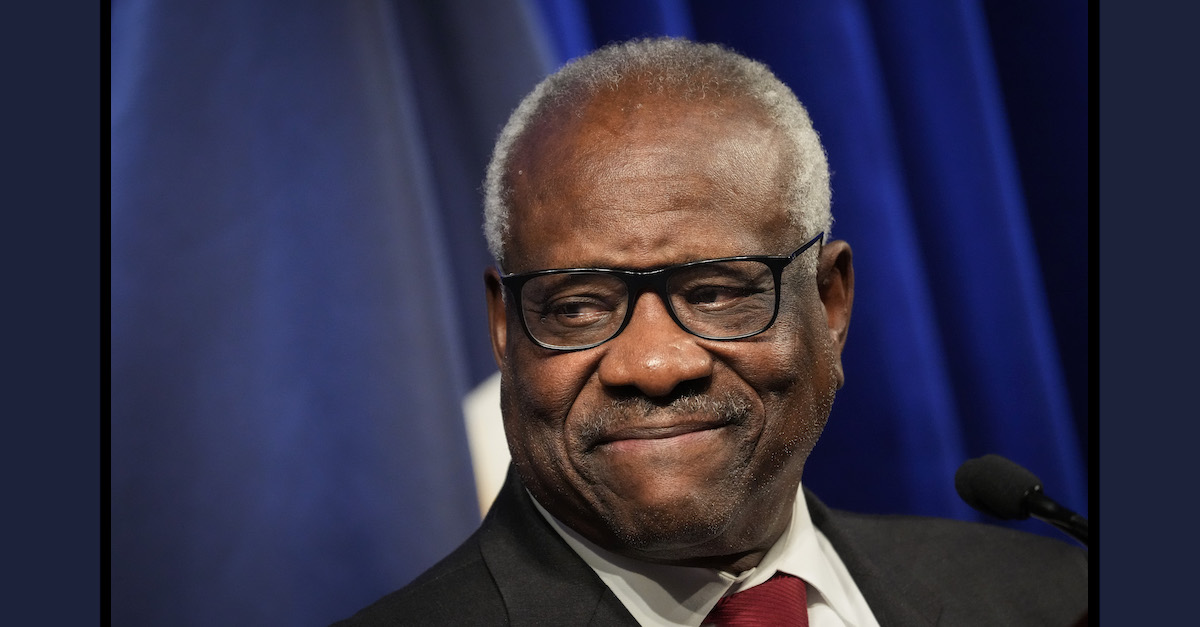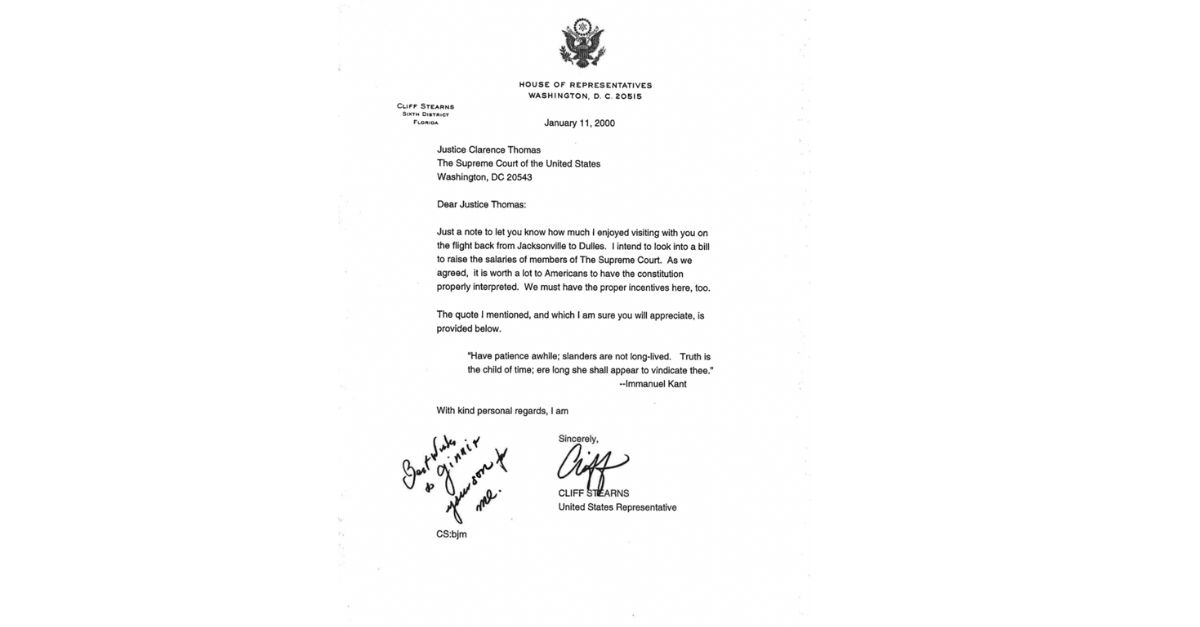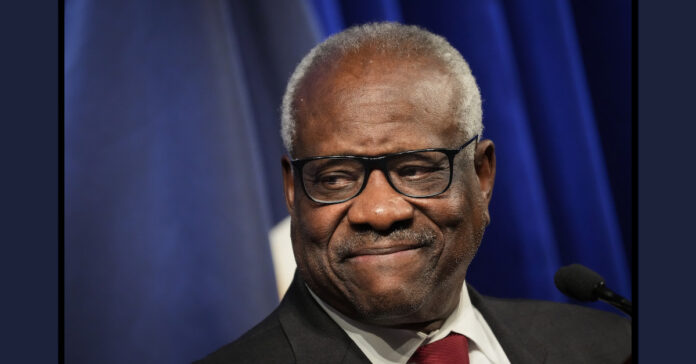
Associate Supreme Court Justice Clarence Thomas speaks at the Heritage Foundation on October 21, 2021 in Washington, D.C. (Photo by Drew Angerer/Getty Images.)
Clarence Thomas told a Republican congressman back in 2000 that members of the nine might walk away from their jobs at the Supreme Court if they were not given a major raise, according to ProPublica’s latest story on the conservative justice.
While the congressman seems to have put a plan into action at the time, it was to no avail. Here are some major takeaways from the article, much of which appears to have been based on documents drafted at the time Thomas spoke with the legislator.
1. Thomas reportedly told a Republican congressman that if the justices’ salaries were not raised, “one or more” of the justices would resign
Clifford “Cliff” Stearns served as the U.S. representative for Florida’s 6th congressional district from 1989 to 2013 until he lost the 2012 election to Ron DeSantis (R), now the governor of the Sunshine State. According to ProPublica, Thomas and Stearns sat next to each other on the flight home from an “off the record” conservative conference held at a luxury resort in Georgia in 2000. The conference, called “Awakening,” was billed as a “conservative thought weekend” that featured golf, shooting lessons, dancing, and aromatherapy along with panel discussions with businessmen and elected officials. Other speakers included former U.S. Attorney General Edwin Meese, former Arkansas Gov. Mike Huckabee (R), and radio host Laura Schlessinger.
Thomas and Stearns spoke, and during the conversation, Thomas told Stearns he was having financial difficulties, the report said. Thomas is said to have urged Stearns to raise the justices’ salaries from $173,600 and to repeal the ban on paid speaking engagements. For context, members of Congress were paid $141,300 at the time.
2. Stearns apparently said he’d look into it … and did
Following his conversation with Thomas, Stearns sent the justice a letter that memorialized the in-flight conversation. A copy of the letter is shown below.

Cliff Stearns Letter to Clarence Thomas
In the letter, Stearns assured Thomas that he “intend[ed] to look into a bill to raise the salaries of members of The Supreme Court.”
“As we agreed, it is worth a lot to Americans to have the constitution properly interpreted,” Stearns continued. “We must have the proper incentives here, too.”
Stearns concluded the brief letter with a quote by philosopher Immanuel Kant that urged, “Have patience awhile; slanders are not long-lived.” The lawmaker added a handwritten note to the typewritten correspondence that read, “Best wishes to Ginni and your son for me.”
Shortly thereafter, Stearns delivered a speech on the House floor about judges’ salaries being affected by inflation. Stearns also engaged a lobbying firm founded by John Podesta (President Bill Clinton’s chief of staff) for assistance.
3. Folks in the judicial community appeared to be immediately alarmed by Thomas’ conversations with Stearns
In 2000, L. Ralph Mecham, the Director of the Administrative Office, was the judiciary’s top administrative official. Mecham held the position for over 20 years and was the longest-serving person to hold the post. Mecham was appointed by United States Chief Justice Warren Burger in July 1985 and during his tenure, Mecham helped implement policies that permitted individual courts to set their own local policies and spending priorities within the overall judicial budget.
Mecham sent a two-page memo to then-Chief Justice William Rehnquist in 2000 describing Thomas’ demands for a raise and asking for guidance.
In the memo, Mecham said that he had learned about the Thomas-Stearns conversation and that Chip Tangen (who worked at the firm Stearns hired) announced the discussion at a meeting called by the Chairman of the Federal Judges Association.
Mecham said that Judge David Hansen, who was Chairman of the Judicial Branch Committee at the time, had been “surprised” that Thomas made a comment about salary raises publicly. Hansen also said that he had a discussion with Thomas about removing the “honoraria limitations” — meaning the prohibition on justices being paid for speeches.
Mecham further said that Tangen, on behalf of Stearns, planned to offer an amendment to an appropriations bill that would “delink” Supreme Court justices’ pay from the pay of all other judges. Stearns wanted to create a commission that would “study the pay needs of justices and report to Congress with the intent that Congress would then vote for a compensation increase solely for the justices.”
Mecham, however, was not so sure about Stearns’ plan. He said that his staff was “reluctant” to assist Stearns with the proposed legislation, feeling it was improper to do so. Mecham said that he also had some concerns about “the overall wisdom” of Stearns’ approach, laying out his thought process for Rehnquist:
Is it wise, for example, to decouple justices both from the rest of the judiciary and Congress and then presumably have a congressional vote on a commission proposal devoted solely to increasing justices’ compensation? Within the judiciary, that could run the risk of looking like a dog in the manger approach. To Congress, it could be seen as another judiciary effort at delinkage from congressional pay which even our best friends have refused to do, although it would be limited solely to justices which might make it more palatable. But I am not at all sure.
Mecham said that Stearns did not appear to be acting with any sense of urgency and was being “leisurely” in getting the legislation drafted.
“However, I understand that Justice Thomas clearly told him that in his view departures would occur within the next year or so,” Mecham wrote.
4. At the time, everyone seemed to know that Thomas and Scalia would benefit the most from a raise
Justice Antonin Scalia, the father to nine children, was known at the time to favor allowing justices to accept paid speaking engagements. Scalia also said that he would not leave the Court over money, however. In fact, Scalia published a letter in 2000 reminding readers that if he cared about money, he would never have taken a pay cut to become an appeals court judge back in 1982.
“The notion that one who was so indifferent to financial gain . . . should contemplate resigning from the Supreme Court for financial reasons now that the last child is in her junior year [in college] is on its face absurd,” Scalia wrote.
Mecham wrote in his letter to Rehnquist that Stearns’ proposal risked obvious political fallout, since it was clear to him that pay increases on the court would benefit two conservative justices in particular — and Democrats would notice.
“[I]t will not take the Democrats and liberals in Congress very long to figure out that the prime beneficiaries who might otherwise leave the Court presumably are Justices Thomas and Scalia,” warned Mecham.
“The Democrats might be perfectly happy to have them leave and would see little incentive to act on separate legislation devoted to Supreme Court justices if the apparent purpose is to keep Justices Scalia and Thomas on the Court,” he continued.
5. Thomas never got what he reportedly asked for
Stearns’ legislation Congress did not give the justices a significant raise, nor did it lift the ban on paid speaking engagements for justices. It is also unclear whether Rehnquist ever even responded to Mecham’s letter.
Rehnquist’s year-end report from 2000 did talk at length about justices’ salaries. Rehnquist said that while federal judges’ salaries were relatively high compared to average salaries in other jobs, that the high price tag is necessary to provide the nation “a capable and effective judicial system” staffed by “experienced men and women of quality and diversity.”
Rehnquist argued that without a pay increase, the question may not be “who is most fit to be chosen,” but rather, “who is most willing to serve,” and that low wages risks having a judiciary made up primarily of the wealthy.
According to ProPublica, one friend remarked about Thomas, “It was clear he was unhappy with his financial situation and his salary.”
ProPublica’s series of stories on Thomas began with reporting on expensive superyacht trips that justice enjoyed on the dime of Dallas billionaire and longtime friend Harlan Crow. Thomas came under intense criticism for not disclosing various Crow-sponsored luxury yacht trips, a real estate transaction involving the home where the justice’s mother lived, and paid private school tuition for Thomas’ grandnephew, whom the justice raised “as a son.”
Calls for the Supreme Court to adopt an ethics code were followed, and the high court eventually responded in November by promulgating a code that conspicuously omitted any of enforcement mechanism.
Senate Democrats have responded by attempting to turn up the heat on Crow and Federalist Society co-chairman Leonard Leo.
Have a tip we should know? [email protected]

